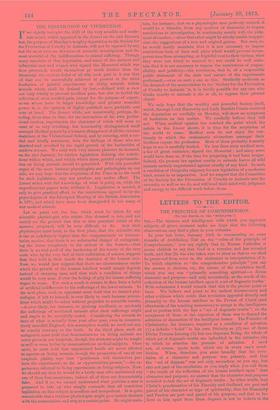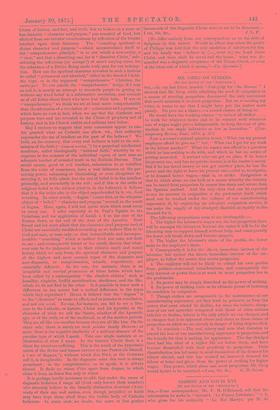LETTERS TO THE EDITOR.
THE PRINCIPLE OF COMPREHENSION.
[TO THE EDITOR OF TEE "SPECTATOR."]
Sin,—The fairness and intelligence with which you approach subjects of grave moment make me hope that the following observations may find a place in your columns.
In your last issue, January 23rd, in commenting on some remarks of Archbishop Tait on the " value of the principle of Comprehension," you say rightly that to Roman Catholics it seems childish to say that God is a revealer, and has revealed truth, and that He has also taken care to show us that no one shall be preserved from error in the statement or interpretation of it. To which objection to "the comprehensive principle " you say the answer is obvious, viz., the nature of the revelation itself, which you say was " primarily something spiritual—a divine character and purpose—and only secondarily, as the result of the reflection of the human intellect upon it, a set of dogmatic truths.' With submission I would remark that this is the precise point at issue. We believe and point to the earliest documentary and other evidence which exists that revelation appealed directly and primarily to the human intellect in the Person of Christ (and afterwards of his teaching successors) to accept in the intelligence and to profess with the lips a " set of dogmatic truths "; on the acceptance of these or the rejection of them was to depend the salvation or damnation of the intelligent hearer. The Founder of Christianity, for instance, required as a condition of salvation (1) a definite " belief " in his own Divinity as (2) one of three Divine Persons forming (3) but one Supreme Being, the whole of which set of dogmatic truths are imbedded. in the initiative rite to which he attaches the promise of salvation. I need not, of course, quote texts which are in every one's recol- lection. When, therefore, you state broadly that the reve- lation of a character and purpose was primary, and that the "set of dogmas" was not only secondary, as you say, but also not part of the revelation, as you imply when you call them "the result of the reflection of the human intellect upon" that character and purpose, we answer that the character and purpose revealed include the set of dogmatic truths. In other words, that Christ's proclamation of his Eternity and Godhead are part and parcel of his character or type of spirituality, that his Humanity and Passion are part and parcel of his purpose, and that to be- lieve in him apart from these dogmas is not to believe in the
Christ of history, and fact, and truth, but to believe in a more or less fantastic " character and purpose," not revealed of God, but
elicited from our interior consciousness by reflection of the human intellect upon these fantasms. The "something spiritual—a divine character and purpose "—which accommodates itself to the " comprehensive principle," is to our minds a non-entity, a " view," and that a dissolving one, for it " dissolves Christ," sub- stituting the reflections (or mirage?) of men's varying views for the substance of a Divine Being made truly man for our redemp- tion. How can the spiritual character revealed in such a fashion be called " permanent and identical," either in the fancied Christ, the type, or in the supposed " comprehensive " Christian, the antitype ? To our minds, the " comprehensive " dodge, if I may so call it, is merely an attempt to reconcile people to getting on without any fixed belief in a substantive revelation, and reminds us of old fables about foxes who have lost their tails. If not so " comprehensive," we think we are at least more comprehensible than the advocates of a revelation of " a character and a purpose " -which have no root in fact, when we say that the character and purpose were and are revealed in the Christ of prophecy and of history, and in his Church visible and militant here below.
May I venture to suggest that your comments appear to take for granted what no Catholic can allow, viz., that authority supersedes the use of intellect on the part of the believer? We hold, on the contrary, that every real believer is held to the sub- mission of the faith (" z)revaoi warrit4;") by a perpetual intellectual condition, called theologically " habitual faith," whereby he re- -cognises in the measure of the individual captus of each man an adequate teacher of revealed truth in the Ecclesia Docens. That moral causes, good or evil conduct, submission to or rebellion from the voice of conscience, have a vast influence on the per- ceiving power, enhancing or diminishing, or even altogether de- stroying it, we fully admit, but the seat of belief is in the intellect primarily, and secondarily in the will ; and if this is the order of religious belief in the subject (that is, in the believer), it follows that it is the order also in the object apprehended by it, viz., God revealing. In other words, " dogma " comes first, as the adequate object of " belief," " character and purpose " second, as the result of dogma. Here, again, I will not quote texts which must occur to every one. I refer especially to St. Paul's Epistle to the Galatians, and his application of Isaiah c. 6 to the case of the Roman Jews, at the end of the Acts of the Apostles. Both 'friend and foe must admit that the character (and purpose too) of Christ are essentially modified according as we believe Him to be God and man, or man only, or that indescribable and incompre- hensible " something " which is neither God, nor man, nor both in one ; and consequently friend or foe surely discern that what- -ever may be the judgment as to their relative merit and moral beauty which we may form, the spiritual character and purpose of the highest and most normal types of the dogmatic and non-dogmatic, or comprehensive, schools, respectively, are essentially different. In the one, for instance, there is an invariable and marked prominence of those habits which have been called by a contemporary " the obsolete virtues," such as humility, virginity, bodily mortification, obedience, and the hie, which we do not find in the other. Is it possible to trace such a difference to any source but a radical difference in the types -which they reproduce ? Hence it follows that the " dogma " is 'to the " character" as cause to effect, and as premiss to conclusion, • and not vice versa. No one, for instance, can fail to see a like- ness to the Catholic, or historic, Christ and his Apostles in the character of what we call the Saints, whether of the Apostolic -age, or of the early, or of the medimval, or of the modern periods. 'They are all like one another because they are all like him. On the other side, there is surely no such positive family likeness ; at -most, there is the negative similarity of a uniform absence of the peculiar type of which I speak. Take one single instance as an illustration of what I mean. In the historic Christ there is a thirst for vicarious suffering. This is the result of the hypostatic union of the divine and human natures in one Person (in himself, a "set of dogmas "), without which this Trieb, as the Germans call it, is inexplicable. In the dogmatic saint this trait is always prominent ; in the comprehensive, so to speak, it is always absent. It finds no raison d'être apart from dogma, in which alone it lives, as fishes live only in water.
It is perhaps hardly necessary to add, that under the name of dogmatic believers I range all (God only knows their number) who sincerely believe in the broadly distinctive doctrinal Christ- ianity of their age and nation, even though prejudice or habit may have kept them aloof from the visible body of Catholic believers. In many such, no doubt, the more or less perfect
lineaments of the dogmatic Christ were or are to be discerned.—
[We differ entirely from our correspondent as to the drift of Scripture in this matter. Would he affirm that when the gaoler of Philippi was told that the only condition of salvation for him and his family was " believe in [i.e., trust in] the Lord Jesus Christ, and thou shalt be saved and thy house," what was de- manded was a dogmatic acceptance of the Nicene Creed, or even of the ideas out of which it sprang ?—ED. Spectator.]



































 Previous page
Previous page